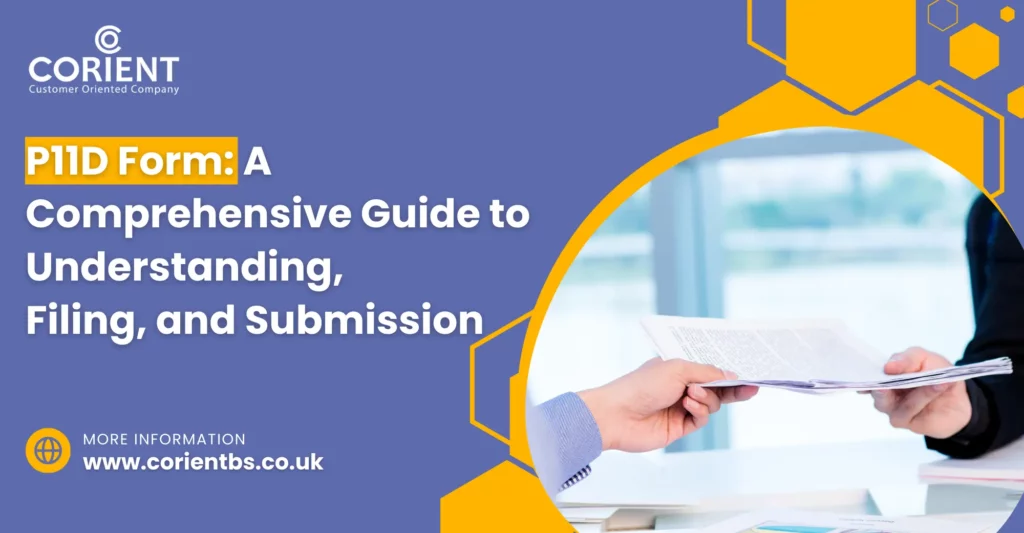
P11D Form: A Comprehensive Guide to Understanding, Filing, and Submission
We have noticed in recent years that accounting practices in the UK are getting bogged with countless accounting tasks for their clients. Among them is the handling of P11D forms. The P11D form comes under the umbrella of PAYE, which your clients use to report the benefits they give to their employees. This form is interested in something other than the income earned. Instead, it focuses on the benefits received by the employees during their employment. Hence, it is safe to assume that this form is very important for both your clients and their employees.
In this blog, we will focus on the workings of P11D and cover everything that you need to know, such as who needs to file it, deadlines, common benefits, exemptions, and how to complete it correctly. So, hold on to your seats and get ready to understand the nitty-gritty of the P11D form.
What is a P11D Form, and Why Is It Important?
Commonly known as benefits in kind, the P11D form is used in the United Kingdom to include all the benefits your client employers provide to their employees. They must submit this form as recommended by the HMRC. Only P11D records all the taxable benefits. Thus helping your clients and their employees meet their tax requirements.
Under the P11D form, multiple benefits, such as automobiles from employers, medical insurance, and loans to employees at low rates or zero interest, can be included. In addition, the P11D form can also contain information on reimbursed business expenses incurred by employees on behalf of the employer. It is important to note that employers must fill out the P11D form accurately to depict employee benefits and expenses for the tax year correctly.
The P11D form is important because it ensures full compliance with HMRC regulations and transparency between your clients, its employees, and the tax authorities with regard to benefits in kind.
Transparency is just one part of many other benefits that make P11D important, such as:

Avoid Penalties
The non-submission of the P11D form or its inaccuracy will only result in penalties from HMRC. These penalties include fines for late submission or inaccuracy.
Full-Tax Compliance
This form ensures the right amount of National Insurance Contributions and taxes are paid on employee benefits, such as company cars, medical insurance, loans, and other perks.
Employee Tax Liability
Your client employees will understand their tax obligations by showing the tax benefits they have received. Also, HMRC will use this information to adjust their tax code.
Brings Accuracy in Payment Records
By incorporating P11D benefits into payroll systems, you will ensure the accurate calculation of NICs and taxes for both employees and employers.
What Does the P11D Form Contains?
The P11D form contains the following information: national insurance number, date of birth, employer’s name, and employer’s PAYE reference number. Also, the forms contain the list of benefits an employee has got from the employers and are required to pay taxes for it. These benefits are as follows:
Transferred Assets
This category includes items such as laptops, automobiles, and accommodations employers provide to their employees to help them perform their duties.
Fuel Allowance
Your client employer will cover fuel expenses and vehicle maintenance if it offers cars to its employees, mainly when the vehicle is used for official work purposes.
Vouchers
Your client employers occasionally offer their employees various vouchers, such as daycare vouchers, to motivate them or make their lives easier. The vouchers offered by employers should be included in the P11D form.
Interest-Free Loans
Employers will provide their employees with loans at low or zero interest rates to buy vehicles to travel to work or get equipment to install at home. Such interest-free loans are included in the P11D form.
Insurance Payments
Under it is the medical insurance coverage provided to each employee. Also included are the services an employee gains from their employer, such as a discounted purchase.
Professional Fees
Fees paid for studies by employees must be included in the form.
Who Needs to Submit the P11D Form?
Based on the information in the P11D form, the employee must pay tax on all the benefits it has enjoyed from its employers. The HMRC will update the PAYE tax code to add additional income tax based on the benefits included in the form. The employer then deducts this additional tax through the PAYE system and pays it to the HMRC.
It is important to mention that employees must frequently check their tax codes to ensure accuracy and avoid overpaying or underpaying taxes. If an employee finds any discrepancies in the tax code, it must contact the HMRC immediately and get it rectified.
P11D Filing Deadline and Consequences of Missing It?
The deadline for submitting the P11D form to HMRC is July 6th, just after the end of the tax year. Failure to comply with the deadline will attract penalties, which will be £100 per 50 employees each month or part-month the P11D(b) is late. It is important to mention that the P11D deadline and penalty for this form are subject to change; hence, it is important to keep yourself well-informed of the penalties and submission process to avoid any hiccups.
These days, accounting practices are majorly handling the filing and submission process of P11D forms on behalf of their clients. However, you must have noticed that your payroll team faces stressful situations when handling multiple forms from different clients. To ease this situation, you can opt for payroll outsourcing services offered by a professional accounting outsourcing service provider. Many of your competitors have tried this option and are reaping its benefits, so do try it out. If interested in opting for outsourcing services, choose the best by thoroughly analysing case studies of service providers. These case studies will show their experience, the challenges they faced, and their achievements.
How to Ensure Accurate P11D Submission
Have you ever had difficulty filing the P11D form for your clients? We know you have, but by being proactive and following the points listed below, this problem can be fixed in no time.
- Collect Personal Details: The personal details include the names, national insurance numbers, and information about the benefits given.
- Value of the Benefits: Certain benefits, such as vehicles for business purposes, are taxed based on their value, and HMRC has determined the rules.
- Reimbursed Expenses: If fuel, food, and phone expenses exceed a certain threshold, they must be recorded.
You may find this point too time-consuming, especially when dealing with multiple forms. In such situations, professional payroll outsourcing services can come to your rescue.
Frequently Asked Questions (FAQ)
Employers must file a P11D form for each employee who has received Benefits in Kind during the tax year. It is the employer’s responsibility to report these benefits to HMRC. It is the responsibility of the employer to report the benefits to HMRC.
Benefits in Kind are non-cash perks provided by employers. Common examples include:
Company cars
Fuel allowances
Health insurance
Interest-free or low-interest loans
Gym memberships
The P11D(b) form is used to report the total amount of Class 1A National Insurance contributions owed on the Benefits in Kind reported on the P11D forms.
If no benefits in kind was extended to the employees during the tax year, then you can submit a nil return to the HMRC.
Class 1A NICs are paid by employers on certain Benefits in Kind provided to employees. The rate is calculated as a percentage of the cash equivalent value of the benefits.
Missing the deadline
Incorrect valuation of benefits
Filing incomplete or inaccurate details
Forgetting to file the corresponding P11D(b) form
Conclusion
We hope this blog has successfully simplified the P11D form and its importance. Understanding that your client’s employees pay the correct tax on their benefits is critical to avoid penalties. It is essential for your clients and you to stay updated to remain compliant and fulfil the complex paperwork of the P11D form. Correctly understanding P11D forms, especially in deadlines and submission processes, what is contained, and its importance in maintaining transparency will make your accounting practice more professional and trustworthy.
However, handling multiple forms means a lot of complex paper and will increase your team’s chance of overloading. But the good news is that the UK accounting market has multiple professional accounting outsourcing service providers who can offer you assistance anytime. Among these service providers is Corient UK which is gathering quite a name. Since 2011, we have been offering our tech-savvy accounting services to countless accounting practices in the UK, from bookkeeping, payroll, year end to the corporation, audit, and VAT services. Our accounting services have brought in qualitative changes for our clients, and we can do the same for you. You can write down your doubts and questions regarding our services on our website contact form and our executive will contact you at the earliest.
Delighted to offer you long-term assistance in the future.


